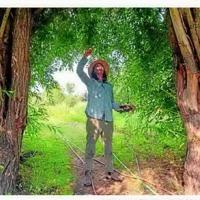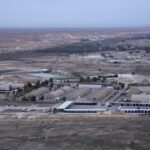HAMILTON — Katrina Mendrey has an apple tree that got away.
It was a unique crabapple tree that bore fruit that tasted just like lychee. It died in 2020, and as far as Mendrey knows, that means it’s gone for good.
But Mendrey’s new business might be able to save others from similar losses. Branches and Roots Nursery will help clients preserve their beloved apples trees through grafting.
“People get really sentimental about trees and for good reason,” Mendrey said. “And so it feels good to be able to propagate trees that are important to people and hold a lot of memories and feelings and emotions.”
Grafting is a technique where the bud, or scion, of one tree is joined with the lower half of another, known as the rootstock. When that bud blooms and starts producing fruit, it will be the same as the fruit from the tree it originally came from.
People are also reading…
Without grafting, replicating the same fruit is difficult. If an apple falls from a tree, and a seed inside of it starts growing, the resulting tree won’t be identical to the tree the apple fell from. Apple trees need the pollen of another variety of apple tree to produce fruit, so any seedlings that come from that fruit are a mix of two trees.
“Eventually those trees might die, and some people really love those trees, and if they want to see the same version of them continue, the way to do that is to graft them,” Mendrey said.
Mendrey is starting small, with 50 trees a year. And she’s planning on staying local, forgoing a website or social media account for word-of-mouth connections. She’s hoping to reach orchard owners trying to preserve a tree that might be dying, or families who are selling their house and need a way to take the apple tree in the backyard with them.
“I’m limited to cold-hardy trees that will grow here in Montana, so I don’t expect to be grafting trees from around the country,” Mendrey said. “It’s really meant to be a local service for folks who want to propagate their trees but maybe don’t know how.”
The grafting process is delicate. First, Mendrey had to pick the right rootstock for grafting. She chose one called Bud 118, which produces large, cold-hardy trees that can survive Montana winters.
But even with the right base for grafting, things can still go wrong. Graft too early or too late and the bud will be vulnerable to Montana’s harsh winter temperatures. Voles and gophers can eat up the rootstock, leaving it unable to provide for the buds. And the bud and rootstock might end up just not being compatible.
“You have to find that sweet spot, where the wood is mature, the weather is right,” Mendrey said. She plans on starting the year’s grafts in mid-August.
Even if a graft fails, Mendrey said she’ll keep trying until she succeeds. And she isn’t satisfied with just grafting the trees. To make sure they can survive in her clients’ yards, she plans on growing the trees for three years before selling them or delivering them to clients.
Prices will range from $200 to $300, and Mendrey plans on selling the trees with vole guards and deer fencing. Cheaper options will come in the form of workshops, where Mendrey will teach beginners how to graft their own trees at Homestead Organics, where the rootstock is kept.
Mendrey has a history grafting and propagating trees. She became the coowner of Chapter One Book Store in 2021, but before that, she worked with Montana State University’s Western Agriculture Research Center.
She managed the center’s Montana Heritage Orchard Program, which works with orchard owners to preserve orchards with older apple trees and document the state’s history with the fruit.
Despite the challenges of the cold, apple trees have a long history in the Bitterroot Valley. During the Apple Boom, a period from the 1880s to the early 1920s, the valley dominated the commercial apple industry with its McIntosh red apples, said Michelle Nowling, executive director of the Ravalli County Museum.
The apples thrive in cooler environments and can survive Montana’s cold snaps—most of the time. By 1924, Montana’s weather had ended the Apple Boom, wiping out orchards with hail damage and a freeze that froze the trees, Nowling said.
But individual trees persevered in people’s backyards, where they were their owner’s pride and joy. Nowling said she feel that the fact that the apples have thrived in such an unusual place is a testament to the character of Montanans.
“That just is the ingenuity of Bitterrooters and of Montanans, that we just see something and we’re like, ‘You know what, we’re gonna figure out a way to make it happen,'” Nowling said. “And I think that people are very proud of that legacy.”
As for Mendrey, she isn’t giving up. The lychee-flavored apple tree might be gone, but it left behind a seedling she plans on grafting this year. Although it isn’t exactly the same, “it’s still a pretty good crabapple, and it has a story,” she said.
“Sometimes it’s also about the story of the trees and preserving just the general genetic diversity of apples in our region,” Mendrey said. “Because they’ve been through a lot. They’ve been through a lot of really cold, hard winters, a lot of dry, dry summers, and so there’s something to that hardiness and grit. I feel like we need grit in our plants for the years to come.”
alexia Partouche is a news intern for the Ravalli Republic and the Missoulian.





